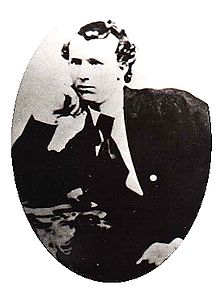| Boston Custer | |
|---|---|
 Boston Custer Boston Custer | |
| Born | (1848-10-31)October 31, 1848 New Rumley, Ohio, U.S. |
| Died | June 25, 1876(1876-06-25) (aged 27) Little Bighorn, Montana Territory, U.S. |
| Place of burial | Woodland Cemetery, Monroe, Michigan |
| Allegiance | |
| Rank | Civilian contractor |
| Unit | 7th U.S. Cavalry, 1874 - 1876 |
| Battles / wars | |
Boston Custer (October 31, 1848 – June 25, 1876) was the youngest brother of U.S. Army Lt. Colonel George Armstrong Custer and two-time Medal of Honor recipient Captain Thomas Custer. He was killed at the Battle of the Little Bighorn along with his two brothers.
Early life
| This section does not cite any sources. Please help improve this section by adding citations to reliable sources. Unsourced material may be challenged and removed. (January 2017) (Learn how and when to remove this message) |
Boston Custer was born in New Rumley, Ohio, one of five children born to Emanuel Henry Custer and Maria Ward Kirkpatrick Custer. In 1863, the family left Ohio and moved to Monroe, Michigan. Boston's older brother Nevin became a farmer due to asthma and rheumatism, while two other older brothers, George and Thomas ("Tom"), became military officers in the Union Army during the American Civil War. Boston had been unable to officially join the Army due to poor health.
Battle

A civilian contractor, Custer served as forage master for his brother George's U.S. 7th Cavalry Regiment in the 1874 Black Hills expedition. He was employed as a guide, forager, packer and scout for the regiment for the 1876 expedition against the Lakota Indians. On June 25, 1876, along with his 18-year-old nephew Henry Armstrong "Autie" Reed, Custer was with the pack train at the rear of Lt. Col. George Custer's troops. Hearing from a messenger that Lt. Col. Custer had requested ammunition for an impending fight, they quickly left the pack train. The pair passed by Frederick Benteen's detachment and joined Custer's main column as it moved into position to attack a sprawling Indian village along the Little Bighorn River. Had they stayed with the pack train where they were assigned, Boston Custer and Autie Reed might have survived the battle.
Death
| This section does not cite any sources. Please help improve this section by adding citations to reliable sources. Unsourced material may be challenged and removed. (January 2017) (Learn how and when to remove this message) |
Like his brothers and nephew, Boston was killed at the area known as "Last Stand Hill." A marble marker commemorates the approximate place where his body was found and identified. Though originally buried on the battlefield, Autie Reed and Boston Custer's remains were exhumed, the only exceptions to the rule that only commissioned officers would be shipped home for reburial. They were reinterred January 8, 1878, at Woodland Cemetery in Monroe, Michigan, near today's Monroe County, Michigan Museum.
Film
Boston Custer was portrayed by actor Patrick Johnston in the TV miniseries Son of the Morning Star (1991).
References
Bibliography
- Custer, Boston & O'Neill, Thomas (Editor) (1993). Letters from Boston Custer. Brooklyn, NY: Arrow and Trooper.
{{cite book}}:|author=has generic name (help)CS1 maint: multiple names: authors list (link)
External links
- George Custer Lobbies for Boston Custer Second Lieutenant Appointment, 1872 Shapell Manuscript Foundation
- A contemporary article on Boston Custer's burial
- "Boston Custer". Find a Grave. Retrieved February 20, 2008.
- Boston Custer's marker (not his headstone)
- 1848 births
- 1876 deaths
- Burials at Woodland Cemetery (Monroe, Michigan)
- George Armstrong Custer
- American military personnel killed in the American Indian Wars
- People from Harrison County, Ohio
- People from Monroe, Michigan
- People of the Great Sioux War of 1876
- Battle of the Little Bighorn
- United States Army personnel of the Indian Wars
- United States Army civilians